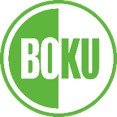The University of Natural Resources and Life Sciences (BOKU), the Alma Mater Viridis, perceives itself as a teaching and research center for renewable resources, as a basis for human life.
Connecting natural sciences, engineering and economic sciences, BOKU works towards an increased knowledge of the ecologically and economically sustainable use of natural resources,
to provide a harmoniously cultivated landscape. Within BOKU, the Institute of Surveying, Remote Sensing and Land Information (IVFL) covers scientific and technical aspects of
geo-information retrieval, in particular using Earth Observation (EO) sensors and Sentinel-2 time series.
The Institute of Surveying, Remote Sensing and Land Information (IVFL) is internationally recognized as one of the leading institutes specialized in the processing and analysis of
Sentinel-2 data and other EO time series. The institute developed a unique web-based processing chain for pre-processing of Sentinel-2 time series, including the extraction of relevant
vegetation traits such as leaf area index (LAI), fraction of absorbed photosynthetically active radiation (fAPAR), fractional coverage, broadband albedo and canopy chlorophyll content (CCC).
Key expertise of the team includes machine learning and neural nets for image analysis, forward and inverse modeling of canopy spectral signatures for the retrieval of vegetation
traits using physically-based radiative transfer models, time series analysis, extraction of land surface phenology and drought indicators. Care is taken that the derived information
products that can be readily uptaken by non-EO experts, for example in the field of precision farming (e.g. EO4WATER) or for large scale drought monitoring and disbursement
of disaster contingency funds (DCFs) (e.g. Kenya).
